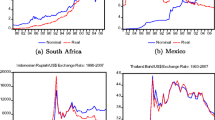Abstract
Since the introduction of the system of floating exchange rates policy-makers have been troubled by uncertainties regarding the effects of this system on international trade. Do exchange rate changes affect trade flows? Can governments manipulate exchange rates? Have countries been “injured” by exchange rate changes? What are the real costs of international monetary instability? Answers to these key questions are given in the following article.
Similar content being viewed by others
References
(Detlef Lorenz: On the Crisis of the “Liberalization Policy” in the Economics of Interdependence, in: INTERECONOMICS No. 7/8, 1978, p. 171.)
See, for example, O. Emminger: The Exchange Rate as an Instrument of Policy, in: Lloyd’s Bank Review, July 1979, pp. 11–12; and Group of Thirty: Foreign Exchange Markets Under Floating Rates (New York: Consultative Group on International Economic and Monetary Affairs, Inc.), 1980, p. 5.
“The Case for Flexible Exchange Rates”, in his “Essays in Positive Economics” (University of Chicago Press), 1953, p. 183.
See, for example, A. Leijonhufvud: Costs and Consequences of Inflation, in: G. C. Harcourt (ed.): The Microeconomic Foundations of Macroeconomics (London: Macmillan), 1977.
“General Principles for World Monetary Reform”, in: H. Corbet and R. Jackson (eds.): In Search of a New World Economic Order (New York and Toronto: John Wiley), 1974, p. 155.
“Money, Tariffs, and the Peace”, in his “Economic Policy for a Free Society” (Chicago: University of Chicago Press), 1948, p. 262.
Author information
Authors and Affiliations
Additional information
GATT secretariat.—This article summarizes the principal arguments and conclusions of the authors’ recent study “Trade Relations Under Flexible Exchange Rates” (September 1980), No. 8 in the series “GATT Studies in International Trade”. It draws heavily on pages 1–11 of that study. The views expressed are those of the authors alone and do not necessarily reflect the views of the Contracting Parties to the General Agreement on Tariffs and Trade or of the GATT secretariat.
Rights and permissions
About this article
Cite this article
Blackhurst, R., Tumlir, J. International trade in a system of floating exchange rates. Intereconomics 15, 267–272 (1980). https://doi.org/10.1007/BF02924648
Issue Date:
DOI: https://doi.org/10.1007/BF02924648




